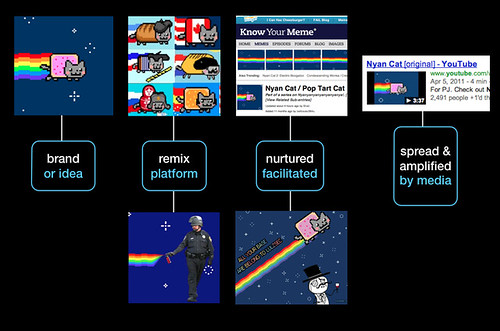This is the third page of livenotes from a panel I was on in Elizabethtown College on Corporate Social Responsibility. You can find the main index here:
I was a speaker on the second panel, which focused on more intimate, and in my case, scrappier organisations. Cristina Ciocirlan, a business professor at Elizabethtown College spoke about the role of family owned businesses in society. Then, Jeff Rutt of Keystone Custom Homes spoke about Hope International, a Christian microfinance organisation.
Cristina pointed out that there’s a gap in the CSR literature, which tends to focus on fortune 500 companies. People often assume that family businesses can’t have the resources or the ability to develop a socially responsible strategy. Data is also hard to collect. Cristina wants to disprove the naysayers and encourage us to pay attention to family businesses.
What leads family businesses to be more socially responsible? More mature family businesses run by older males tend to be more likely to engage in CSR practices. Families know that the repuation of their family is shaped by the actions of their companies. They have the broad networks needed to give back to the community. Communities often love their local businesses, so family businesses have a lot to gain from carrying out and communicating their social values.
Small businesses who want to carry out CSR face significant challenges. Sometimes, issues like climate change might seem too large for a small business to tackle. They have less control over their supply chains. On the other hand, their stakeholders are often local, and they have strong incentives to act with enlightened self interest.
Cristina concluded by encouraging us to imagine creating social impact in our small businesses. You don’t have to be Google to take care of your employees and serve your community.
Next up was Jeff Rutt of the Christian microfinance organisation Hope International. He started with a short film ad, “A Revolution of Hope,” which explains the work of Hope International.
Jeff told us that “good intentions are not enough.” He referred us to passages in the Bible: Matthew 28 and the Great Commission, the admonition of Matthew 25 to meet others’ needs, and the instruction in James 15 to not sit by as other people suffer. The story of Hope International started after the fall of the Soviet Union, when people from his church sent containers of food to needy people in the Ukraine. In some cases, they were hurting more than helping. The flour they sent caused difficulties for local businesses. They regret making local religious leaders choose who to feed. Overall, they regret sending materials rather than helping people.
Jeff pointed us to Robert Lupton’s book “Toxic Charity: How Churches and Charities Hurt Those They Help,” a problem which can be especially marked after natural disasters. He urged us to ask, “What is the receiver thinking?” He argued that directly meeting people’s needs creates a sense of entitlement. We need to go beyond good intentions to support people’s dignity.
After the failure in the Ukraine, Jeff’s family wanted to find a better way. Together as a family, inspired by the work of the Grameen Bank, they started out by giving 12 micro-loans and basic business training in Ukraine. Local media picked the story up, and they had a large influx of participants. They also combined microfinance with youth religious education, offering after-school and summer clubs for Ukranian youth.
In the intervening years, Hope International has offered around 1.5 million loans to people in 16 countries. They have 96% repayment rate, with 70% of their loans going to women. He encouraged us to read the latest book by their CEO Peter Greer, “The Poor Will Be Glad.”
Overal, Jeff urged us to consider integrating our values with our social actions. Each loan officer at Hope International has the “head of a banker, heart of a paster, and the soul of a missionary.” He concluded by telling the story of one of their loans in the Dominican Republic, to a man who makes wheelbarrows, whose business has flourished. Jeff smiled widely when he shared that this man has now come to follow evangelical Christianity.
I was the final speaker. I talked about open brands and what happens when we give up our assumptions about personal achivement and open our organisations up to the creativity of others and the amazing things they can do in their communities. Building on a conversation I had earlier this year with Josh Stearns, I talked about five projects that inspire me: The Ministry of Stories, IDEO.org’s TEDx in a box, The Harry Potter Alliance, The Awesome Foundation, and Scratch.
Each of these successful and generative projects share a common set of ideas (with Nyancat): a powerfully generative idea, support for creative reuse, community facilitation, and amplification of participant voices to feed excitement and grow the vision. I’ll post more complete notes soon, but for now, here’s a Nyancat version of my slide.
Overall, I had an amazing time at Elizabethtown hearing from the other speakers, connecting with Dr Yunus, and seeing longtime friends. I’m also hoping to develop my thoughts on open brands further in the coming months.

